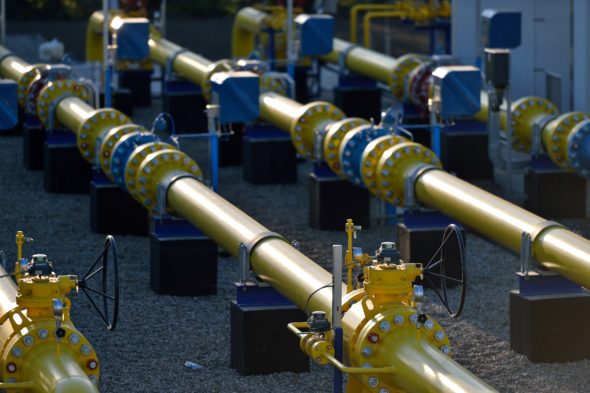The new law that is to protect consumers against increases in gas prices in Poland hides many other solutions, that may cause a gas market crisis. The lawmakers are very open about the gas crisis, which is to be mitigated, among other things, by changing the ticketing service, where the responsibility for gas reserves will be transferred to a government agency – writes Wojciech Jakóbik, editor-in-chief BiznesAlert.pl.
The authors of the Act on Special Measures to Protect Gas Consumers Due to the Situation on the Gas Market say in the documents submitted to Deputy Minister of State Assets Maciej Małecki that the proposed regulation serves „to protect natural gas consumers in Poland from the possible consequences of the gas crisis, the depth of which and the time frame are not precisely known”. It is worth reminding that one of the causes behind the record gas prices in Europe is Russia’s Gazprom restricting gas supply, as it is awaiting approval for the disputed Nord Stream 2 gas pipeline, and new long-term contracts. The Yamal contract signed by Poland and Russia will expire at the end of 2022.
We already know which market participants will be included in gas tariffs, so that they are protected from the gas prices increase, that may reach even several hundred percent. This shield will be up until 2023, as in 2024, according to Poland’s Energy Policy until 2040, the gas market will be liberalized. At that point the gas prices for households, the last entities covered by the tariff, will be freed. This means from then on those prices will depend on the situation on the uniting EU market, which has been designed by the European Commission and member states. Under normal conditions, the price of gas offered on the European market is lower than the one in long-term contracts with Gazprom. However, the Russians want to use the energy crisis to conclude new agreements. One day the crisis will be over, but the long-term contracts will be here to stay. I wrote about this elsewhere.
The above-mentioned law is intended to protect against increases, but also to ensure that the main gas company in the country – PGNiG, has a stable future. First, it is to introduce compensation for gas traders that sell gas to consumers protected by the tariff. Freezing gas prices and spreading the tariff increase across three years (this year by 54, instead of several hundred percent) will result in losses for the gas seller, who buys gas at a high price due to the energy crisis and sells it cheaply, because of the protection mechanisms. Also, the seller cannot sell the gas at a price market to entities that will be moved from the market to the tariff.
The state is also required to provide guarantees fot the liabilities of PGNiG, which is obligated by law to ensure the security of gas supply. The justification for the act says that this is about those „who must obtain revolving financing to provide an adequate level of liquidity to timely settle obligations related to the ensuring of liquidity on the stock market, continuity of energy supply or readiness to provide the services of an ex-officio seller”. It is worth recalling that PGNiG has already borrowed PLN 2.7 billion to pay for gas, which it will then sell at a loss. Other loans are to come. It is worth citing in this context the example of the German Uniper, which on the 4th of January borrowed a total of EUR 8 billion from various sources in order to maintain liquidity. Gas sellers across Europe have to borrow money for the fuel and repay the loans after it is sold.
Another solution proposed in the law is to give the Government Agency for Strategic Reserves the opportunity to provide the so-called ticketing service. Until now, this service has been offered under the Gas And Oil Reserves Act to all entities that are unable to meet their statutory obligation to maintain such reserves, and may instead purchase this service from Gas Storage Poland. By the way, these responsibilities will be taken over by Gaz-System thanks to an act introduced in 2021. This is a logical step, considering the situation on the energy and oil markets, where the operators Polskie Sieci Elektroenergetyczne (power grid operator in Poland – ed.) and PERN (major oil transport and storage company in Poland -ed.) are responsible for the energy and oil storage facilities respectively. Now PGNiG will be able to buy such a service from the Agency by paying for the reserves it collects instead of for the gas it would collect itself. Thus, it will acquire more liquidity, because the ticket fee is compared in the industry to leasing that is much cheaper than buying gas, which in this metaphor equals buying a car. This means that the Agency will collect the stocks required by law. It may also be a way to assuage the European Commission’s concerns about the impact of the Stocks Act on the liberalization of the gas market in Poland.
The solutions that are being implemented to combat the crisis seem to be of a temporary nature and will disappear with the liberalization of the gas market in 2024, unless a new idea to change the gas market emerges. Unofficially, some gas producers are demanding the French model (also criticized in Brussels), in which some of the customers who are particularly sensitive remain on the tariff forever, keeping them safe against any gas crisis. This would limit the development of the gas market, but perhaps it would also increase the security of supply. The same was true of the Stocks Act, which was criticized by the European Commission at the time, but which ensured Poland has a record percentage of gas reserves in storage during the energy crisis, which in official documents has already taken on the face of a gas crisis.









